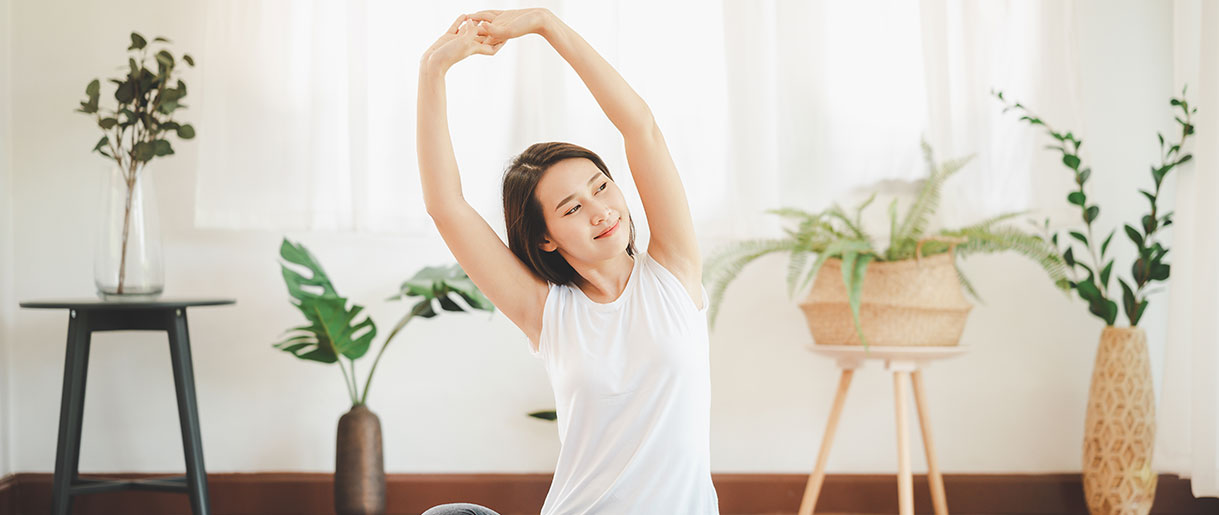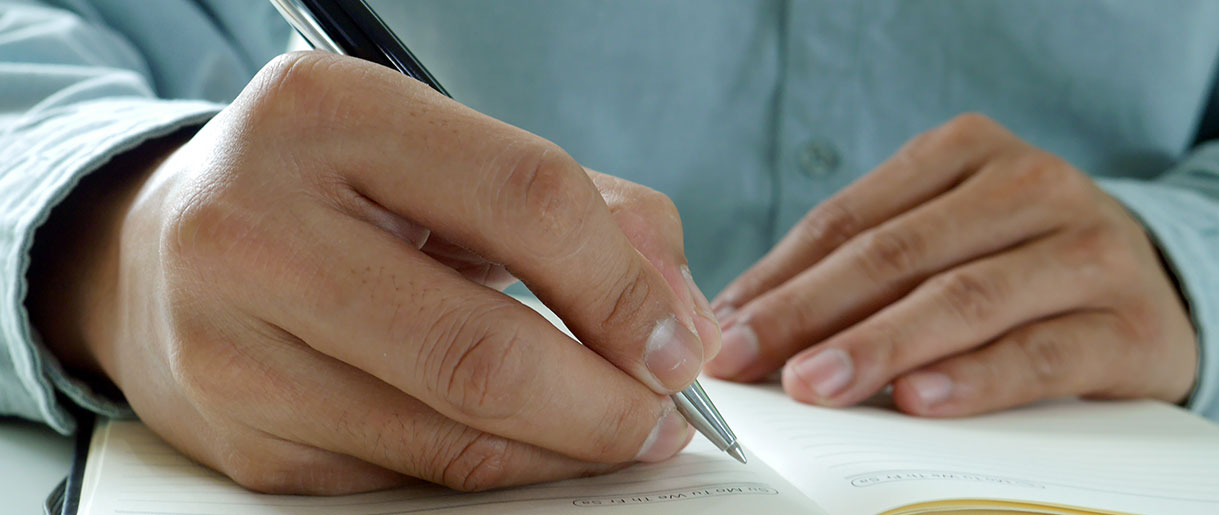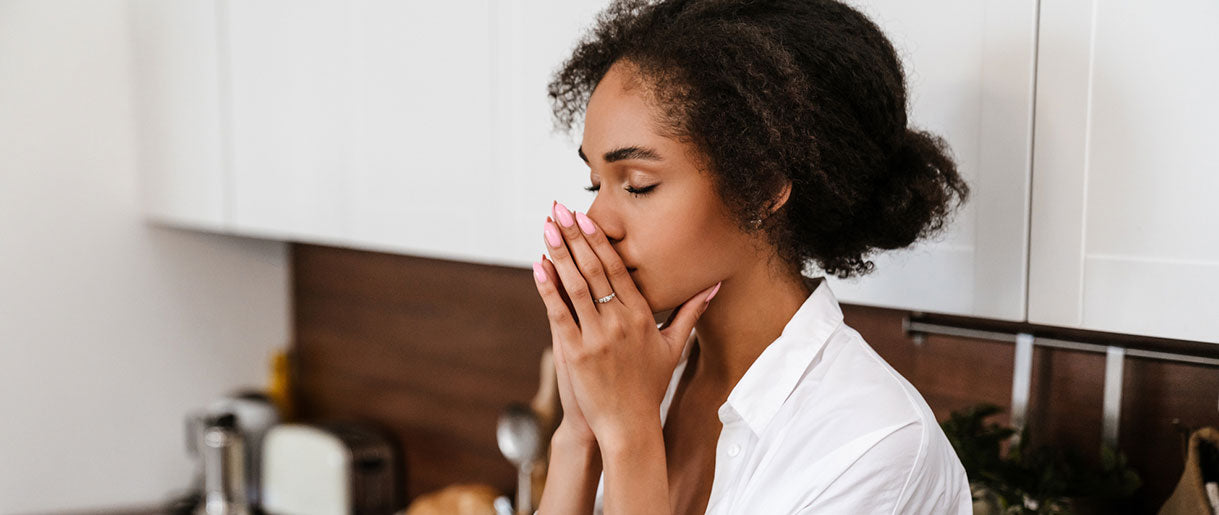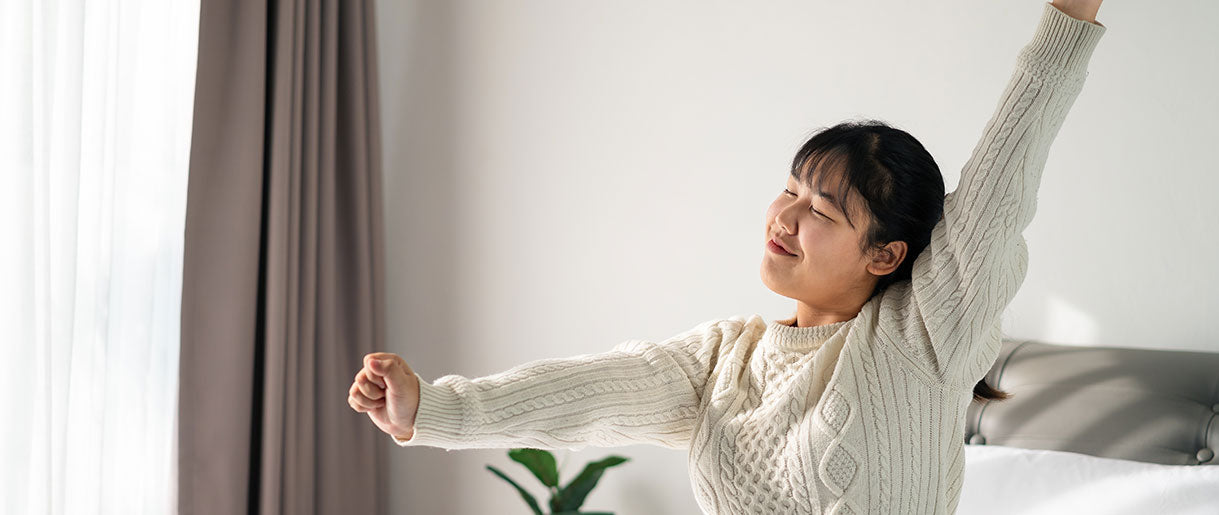Picture this: you wake up, and instead of letting anxiety take the reins, you decide to embrace a morning routine that's as simple as it is transformative.
It all starts with deep, mindful breathing—where each inhale is a wave of calm, and each exhale releases your worries.
Gently transition into light stretches, letting your body awaken in sync with a calmer mind. Next, nourish yourself with a thoughtful breakfast, choosing foods that comfort and energize you.
Spend a few minutes journaling, transforming anxious thoughts into structured words on paper. And, if possible, step outside for a brief moment, connecting with the world and its natural rhythm, a reminder of life's larger canvas.
Each morning presents a new opportunity, not just to start afresh but to reshape your entire day. For those who wake up with a heart heavy with anxiety, the early hours can feel overwhelming.
Yet, with this carefully crafted routine, the morning can transform into a peaceful sanctuary where anxiety doesn't dictate the pace.
Join us as we delve deeper into each element of this routine, understanding how it can contribute to a sense of calm and control.
10 Things to Include in Your Morning Routine for Anxiety
1. Mindful Breathing
Imagine starting your day not with the rush of to-dos or the buzz of your phone but with the calm rhythm of your breath.
Mindful breathing can be a cornerstone of your morning routine for mental health, especially when anxiety tries to take the lead. It's about taking a moment to connect with the here and now, one breath at a time:
- Find a Quiet Spot: In the morning, find a peaceful place to sit undisturbed. This could be a cozy corner of your room or even your bed.
- Focus on Your Breath: Close your eyes and take deep, slow breaths. Inhale through your nose, feeling your chest and belly expand, then exhale slowly through your mouth.
- Count Your Breaths: Try counting each breath to keep your focus. Inhale on count one, exhale on count two, and so on, up to ten. Then start again.
- Acknowledge Wandering Thoughts: It's normal for your mind to wander. When it does, gently bring your focus and concentration back to your breath without judgment.
Incorporating mindful breathing into your morning sets a tone of tranquility for your day. It's like telling your body and mind, "Hey, we're in this together and starting off calmly."
2. Gentle Stretching or Yoga

Embrace the day with gentle stretching or yoga, turning your morning into a soothing dance of movement and breath. When anxiety looms, these practices can be your sanctuary, a space to ease tension and nurture a sense of peace.
- Start with Simple Stretches: Begin with basic stretches that don't demand too much from your body. Reach your arms above, gently stretch side to side, or touch your toes. Feel each stretch as a release of overnight stiffness and welcoming the day's potential.
- Flow into Yoga: If yoga is your choice, opt for calming poses like Child's Pose, Cat-Cow, or Mountain Pose. These poses are not just movements but an invitation to connect deeply with your body and breath, creating harmony and balance.
- Focus on Breathing: With each stretch or pose, synchronize your breath. Inhale as you expand or stretch, and exhale as you release or fold. This breath work is key to turning physical movement into a meditative practice.
- Create a Comforting Space: Make sure your space feels inviting and calming, whether it's a quiet corner with a yoga mat or just a soft rug. Add a plant, light a candle, or play soft music to enhance the serene atmosphere.
Incorporating these gentle movements into your morning routine for success can significantly reduce anxiety levels.
3. Mindfulness or Meditation
Imagine dedicating a part of your morning to stillness and inner peace, creating a buffer against the day's anxieties (1).
Mindfulness or meditation can be your secret weapon in the battle against anxiety (2). This tool brings you back to the present without worries about the future or ruminations about the past.
- Choose a Quiet Time: Early morning, when the world is still waking up, can be ideal for mindfulness or meditation. It's a time when minimal distractions allow you to focus inward.
- Find Your Meditation Spot: Whether it's a comfortable chair, a cushion on the floor, or even your bed, find a spot where you can sit comfortably and undisturbed.
- Start with Short Sessions: If you're new to this, start with 5-10 minutes. Use a timer if it helps, so you're not distracted by the clock.
- Guided Meditation Options: For beginners, guided meditations can be beneficial. Numerous apps and online resources offer guided sessions, ranging from mindfulness exercises to visualization techniques.
- Focus on the Present: The essence of mindfulness and flow state meditation is being fully present in the now. Pay attention to your breath, the sensations in your body, or the sounds around you. When your mind wanders, gently bring it back to the present moment without judgment.
Integrating mindfulness or meditation into your morning routine for depression or anxiety can change how you interact with your day, allowing you to minimize or eliminate anxiety (3).
4. Healthy Breakfast

Kickstart your day with a breakfast that does more than just satisfy your hunger—it also sets the stage for a calmer, more centered you.
When anxiety is part of your morning equation, what you eat can play a crucial role in how you feel (4). Choosing the right foods can be like giving your body and mind the nourishment they need to tackle the day with resilience.
- Opt for Complex Carbohydrates: Think whole grains like oatmeal, whole wheat bread, or quinoa. These foods release energy slowly, helping to keep your mood stable.
- Include Protein: Foods high in protein, such as Greek yogurt, eggs, or a smoothie with nut butter, can help keep you full longer and stabilize blood sugar levels, reducing anxiety symptoms.
- Don't Forget Healthy Fats: Avocado, nuts, and seeds are excellent sources of healthy fats, which are essential for brain health and can help to improve mood.
- Add Fruits and Vegetables:Incorporate fruits and veggies for various vitamins and minerals. The natural sugars in fruits also provide a quick energy boost.
- Stay Hydrated: Ensure you're drinking enough water along with your meal. Dehydration can sometimes be mistaken for anxiety.
A mindful breakfast routine is not just about the food; it's about creating a moment of calm in your morning. It is also an excellent way to get energy in the morning.
5. Journaling
Imagine starting your day by pouring your thoughts onto paper, transforming the swirling storm of anxieties into a stream of clear, manageable words.
Journaling in the morning can be a powerful tool to confront and ease your anxiety (5), allowing you to start the day with a lighter heart and a clearer mind.
- Set Aside a Quiet Time: Dedicate a few minutes each morning to journaling. This can be right after you wake up with energy, as part of your breakfast routine, or after your mindfulness practice.
- Choose a Comfortable Space: Find a cozy spot where you feel relaxed and undisturbed. It could be at your desk, in your favorite chair, or in bed.
- Write Freely: Let your writing flow without worrying about grammar or structure. Write about your feelings, worries, hopes, or anything that comes to mind. The idea is to externalize your thoughts and emotions.
- Reflect on Positives: Try to include positive aspects in your journal. What are you looking forward to today? What are you grateful for? This practice can help shift your focus from anxiety to positivity.
- Use Prompts if Needed: If you're unsure where to start, use journaling prompts like "One thing I'm anxious about today is…" or "I can find peace today by…".
Journaling is more than just a writing exercise; it's a way to confront your anxieties and recognize patterns in your thoughts.
6. Setting Daily Goals

Imagine greeting each morning not with uncertainty or worry but with a clear sense of direction. Setting daily goals as part of your morning routine can guide you through the fog of anxiety, providing structure and a sense of achievement.
- Keep It Simple and Achievable: Start with small, manageable goals. This isn't about overloading your day; it's about creating a sense of purpose and accomplishment.
- Write Down Your Goals: There's power in seeing your goals in writing. Use a notebook, planner, or digital app to jot them down. It makes them real and tangible.
- Prioritize Your Tasks: Identify the most essential task for the day. This is your focus. Completing this can give you significant accomplishment and reduce anxiety about other tasks.
Integrating goal setting into your morning routine for energy can transform your approach to the day from apprehension to purpose and control. It's about breaking down the day into smaller, more manageable parts, making it less overwhelming.
7. Positive Affirmations
Start your day by planting seeds of positivity in your mind with affirmations. These powerful, positive statements can be a crucial part of your morning routine, acting as a shield against the waves of anxiety. They're like gentle reminders about your strength, worth, and ability to handle the day's challenges.
- Choose Affirmations That Resonate: Pick statements that feel meaningful and empowering to you. It could be as simple as "I am capable," "Today, I choose to focus on what I can control," or "I am stronger than my anxiety."
- Repeat Them with Conviction: Stand in front of the mirror, look yourself in the eyes, and say these affirmations aloud. Hearing your voice assert these positive truths can be incredibly powerful.
- Make It a Ritual: Consistency is vital. Make affirming yourself a regular part of your morning. It could be while dressing, brewing mushroom coffee, or preparing breakfast.
Incorporating positive affirmations into your morning can set a tone of self-compassion and confidence. It's about overriding the anxious thoughts with reminders of your power and resilience.
8. Connect with Nature

Embrace the tranquility of nature as part of your morning routine to help calm your anxious mind (6).
Whether it's a brief walk, a moment in your garden, or simply enjoying your coffee near an open window, connecting with nature can be a serene start to your day.
- Morning Walks: Start your day with a short walk outside. The combination of fresh air, natural light, and gentle movement is a powerful trio for lifting your spirits and calming your mind.
- Enjoy Your Breakfast Outdoors: If you have a balcony, porch, or garden, take advantage of it. Enjoying your breakfast outside allows you to start your day surrounded by the calming effects of nature.
- Gardening: Gardening, even for a few minutes in the morning, can be incredibly therapeutic.
Incorporating nature into your morning routine for men or women offers a natural, peaceful way to combat anxiety.
It reminds us of the world's vastness and beauty, providing a perspective that can make our worries seem smaller and more manageable.
9. Limiting Screen Time
In a world where screens are our constant companions, starting your morning without them can be a peaceful rebellion against anxiety (7).
Before diving into the digital world of emails, social media, and news, give yourself a moment of tranquility. This small act of limiting screen time can profoundly affect your mental state (8) throughout the day.
- Create a Screen-Free Zone: Consider making the first hour of your morning screen-free. Use this time for calming activities like reading, meditating, or simply enjoying the quiet.
- Delay Checking Emails and Social Media: Resist the urge to check your phone as soon as you wake up. This reduces anxiety and helps you prioritize your mental well-being over external demands.
- Morning Tech-Free Rituals: Develop morning rituals that don't involve technology. It could be making coffee, stretching, or writing in a journal.
Limiting screen time in the morning helps create a buffer zone between the peacefulness of sleep and the day's demands. It allows you to set a mindful tone for your day, free from the anxiety and overstimulation that often come with early morning screen use.
10. Gratitude Practice

Begin your day on a note of thankfulness with a simple gratitude practice. This small yet profound habit can be a powerful antidote to anxiety, shifting your focus from worries and stress to appreciation and positivity. It's about recognizing the good in your life, even on days when it feels like a challenge to do so.
- Keep a Gratitude Journal: Dedicate a few minutes each morning to write down things you're thankful for. It could be as significant as a loving relationship or as simple as a warm cup of mushroom coffee or regular coffee.
- Reflect on the Positive: Take a moment to think about why you're grateful for these things. This reflection deepens the feeling of gratitude and its positive impact on your mood.
- Start or End with Gratitude: You can make this the first thing you do in the morning or integrate it into another part of your routine, like during breakfast or while you're getting ready for the day.
- Use Gratitude Prompts: If you're struggling to think of things to be grateful for, prompts can help get you started. Questions like "What brought me joy yesterday?" or "Who in my life am I thankful for?" can be useful.
A gratitude practice each morning sets a foundation of positivity for your day. It helps rewire your brain to focus on the positive aspects of life, which can be particularly helpful in managing anxiety.
Why Craft a Morning Routine for Anxiety?

Imagine for a moment that you could start each day with a secret weapon against anxiety, a powerful tool that helps you face the world with a greater sense of calm and resilience. That's exactly what a morning routine can be—your very own personal superpower.
But why is a morning routine so beneficial for those dealing with anxiety? Well, it all comes down to setting the tone for your day.
When you wake up and immediately engage in activities that promote relaxation, mindfulness, and self-care, you're essentially sending a message to your brain that says, "Hey, we've got this! We can handle whatever comes our way."
Think of it like this: if you start your morning by scrolling through social media, reading anxiety-inducing news, or rushing out the door in a frenzied state, you're setting yourself up for a day filled with stress and worry.
But if you take the time to breathe deeply, stretch your body, nourish yourself with a healthy breakfast, and engage in a bit of self-reflection through journaling, you're creating a solid foundation of calm that can help you navigate even the most challenging moments.
But the benefits don't stop there. A morning routine can also give you a sense of control over your day, which is incredibly empowering when you're dealing with anxiety.
By carving out time for yourself and prioritizing your well-being, you're reminding yourself that you matter, that your needs are important, and that you have the power to shape your own experiences.
And let's not forget the long-term effects of a consistent morning routine. Over time, these positive habits can help rewire your brain, strengthening the neural pathways associated with relaxation, resilience, and self-compassion.
In other words, the more you practice these calming rituals, the more naturally they'll come to you, even in the face of anxiety-provoking situations.
So, whether you're a morning person or not, consider giving a morning routine a try. It may just be the secret weapon you need to start each day with a greater sense of peace, purpose, and positivity.
FAQs About Morning Routine for Anxiety
Is It Okay To Modify My Routine On Days When My Anxiety Is More Severe?
Of course! Modifying your routine on high-anxiety days isn't just okay; it's brilliant. Think of your routine as a comfy sweater—it's there to make you feel good, not restrained.
If some mornings feel heavier, it's alright to switch things up. Maybe swap that workout for calming breathing exercises or switch off an alarm for a day.
Listen to what you need; it's all about finding balance. And always remember: your routine is there to serve you, not vice versa.
Should I Force Myself To Practice Positive Affirmations When I'm Feeling Anxious?
Definitely not! Positive affirmations can be powerful, but they might not be helpful if they don't feel authentic or are forceful. It's essential to meet yourself where you are.
Some days, gentle self-talk or simply acknowledging your feelings might be more beneficial than pushing for positivity. Remember, it's okay to have days when you just acknowledge your feelings without trying to change them.
Healing and growth are as much about understanding as they are about changing. Find what genuinely resonates with you, and don't force a square peg into a round hole.
How Do I Motivate Myself To Follow A Morning Routine When My Anxiety Is High?
Finding motivation during high-anxiety periods is challenging but not impossible. First, reframe your perspective: Instead of viewing a morning routine as a long checklist, see it as a series of small acts of self-care.
Start with just one tiny task. Maybe it's just taking a deep breath, sipping water, or stretching for a minute. Celebrate these small wins; they build momentum.
It's also helpful to remember your "why." Reflect on how you've felt on days when you followed even a bit of your routine. Over time, these positive feelings can serve as motivators.
Lastly, be kind to yourself. Sometimes, your best might just be getting out of bed—and that's okay. Progress isn't linear; it's about consistent effort, not perfection.
Key Takeaways
In the quiet moments of dawn, navigating the maze of anxiety might seem like an Olympian feat. Yet, as we've journeyed through, every sunrise presents a chance to curate a morning that cushions our worries.
Whether it's the therapeutic act of grounding, the simple nourishment choices, or even the whispered self-reassurances, each small act plays a part in molding a healthier start to our day. But remember, it's not about perfection but intention and progression.
So, as you sip on your morning brew, feeling the warmth enveloping your hands, ponder this: What small step can you take tomorrow? Share your thoughts, your successes, and your hurdles.
With its stumbles and strides, every morning story enriches this shared tapestry of our collective journey toward brighter mornings. Dive into the comments, and let's continue the conversation. Here's to redefined mornings, one gentle step at a time.🌅
References
- Randomized Controlled Trial of Mindfulness Meditation for Generalized Anxiety Disorder: Effects on Anxiety and Stress Reactivity, (1), https://www.ncbi.nlm.nih.gov/pmc/articles/PMC3772979/
- The Effect of Mindfulness-Based Therapy on Anxiety and Depression: A Meta-Analytic Review, (2), https://www.ncbi.nlm.nih.gov/pmc/articles/PMC2848393/
- Mindfulness and Symptoms of Depression and Anxiety in the General Population: The Mediating Roles of Worry, Rumination, Reappraisal and Suppression, (3), https://www.frontiersin.org/articles/10.3389/fpsyg.2019.00506/full
- Diet and Anxiety: A Scoping Review, (4), https://www.ncbi.nlm.nih.gov/pmc/articles/PMC8706568/
- Effects of Expressive Writing on Psychological and Physical Health: The Moderating Role of Emotional Expressivity, (5), https://www.ncbi.nlm.nih.gov/pmc/articles/PMC3830620/
- Associations between Nature Exposure and Health: A Review of the Evidence, (6), https://www.ncbi.nlm.nih.gov/pmc/articles/PMC8125471/
- Associations between screen time and lower psychological well-being among children and adolescents: Evidence from a population-based study, (7), https://www.ncbi.nlm.nih.gov/pmc/articles/PMC6214874/
- The associations between screen time and mental health in adolescents: a systematic review, (8), https://bmcpsychology.biomedcentral.com/articles/10.1186/s40359-023-01166-7










Let Us Know Your Comments